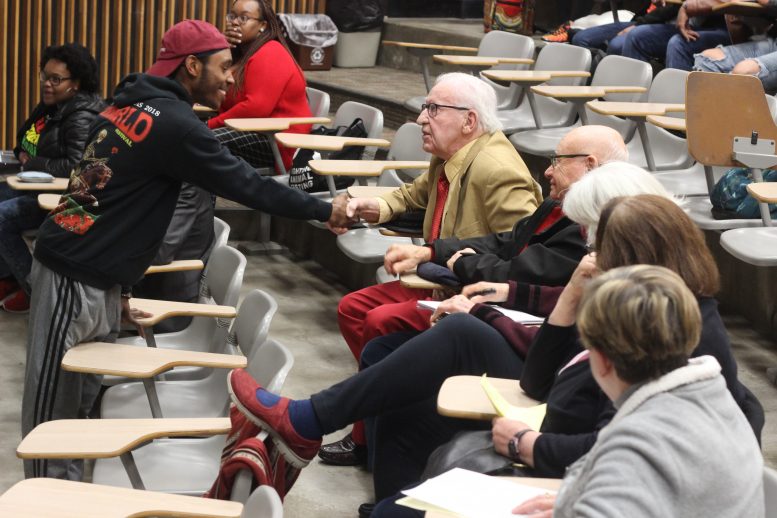By DAVID DUPONT
BG Independent News
For those who oppose changing the name of the Gish Film Theater on campus, Lillian Gish represents a link to the history of film, the queen of the silent age.
She graced the Bowling Green State University Campus with her presence four times, starting in 1976 when the theater was dedicated.
For the black students who spoke at the town hall called to discuss the changing the name of the theater, Gish’s association with the 1915 film, “The Birth of a Nation,” represents a history of anti-black violence by the Ku Klux Klan and others. The blockbuster film, directed by D.W. Griffith based on the novel “The Clansman” is credited with helping with the revival and spread of the Ku Klux Klan.
That racism is not dead, students said, and is still evident on the BGSU campus.
At the beginning of the meeting, hosted by the Black Student Union, Kyle Thompson, the group’s president, flashed images of hate speech found on campus and the online news story about the racially motivated assault that occurred nearby last week.
“Students don’t feel safe on or off campus,” he said.
Several other black students echoed that sentiment.
Ky Wilson said as a black student she faces constant reminders that this is a setting dominated by whites. “It’s exhausting to be a black person on this campus.”
Having the reminder of a racist film in the heart of the student union, exacerbates that.
Raymond Craig, dean of the College of Arts and Sciences, said that “there’s no slam dunk” in deciding the issue. “If this was named the D.W. Griffith theater, we would have solved this problem a long time ago,” he said. The film presents “a particular construction of race that’s problematic.”
That includes promoting the image of black men preying on vulnerable white women, including the character played by Lillian Gish.
The theater is named for Lillian Gish as well as her sister Dorothy. Lillian Gish had a long career as an actor and advocate for preserving films. “She spoke to the power of film,” Craig said.
Craig was charged by BGSU President Rodney Rogers with forming a task force, which is made up half of students and half of faculty and staff, to consider the naming after the BSU brought the issue to the forefront in February.
The 12-member task force, Craig said, will give Rogers its report next Wednesday, by close of business.
Rogers will issue a statement accepting or rejecting the task force’s recommendation before the end of the term, Craig said.
Ultimately the issue will be presented to the university’s Board of Trustees.
Near the front sat a row of supporters of the retaining the theater’s name including retired English professor Ralph Haven Wolfe, who founded the theater as part of his advocacy for having film studies be part of the curriculum.
Wolfe did not speak during the 90-meeting session. But later reiterated his belief that “Birth of Nation” was but one of more than 100 films Gish made in her career that spanned more than 80 years.
Taking the Gish name off, including that of Dorothy Gish, who was not in “The Birth of a Nation,” amounted to guilt by association.
And he said Lillian Gish had little idea of the totality of the film. Wolfe said she refused to make promotional appearances for it.
Frances Brent said Gish career extended beyond acting. She engaged in the business side of film at a time when that was unusual for women, and as such is a model for women today.
Several students insisted they were not trying to discredit Gish’s career, but they could not ignore her central role in “Birth of a Nation.”
Barbara Carr disagreed. Lillian Gish was “being demonized.”
Hayley Fournier, president of the BGSU of the College Democrats, and a history major, said that throughout her long life — Gish died in 1993 just shy of her 100th birthday — the actress never denounced the message of the movie nor addressed its impact.
That impact included, Fournier said, the practice of the KKK burning crosses to intimidate its victims that was inspired by “Birth of a Nation.”
The campus Democrats have endorsed the name change as have the campus Republicans. In a time of deep partisan divide, that both groups would agree is significant, Fournier said.
LaNeisha Pickens asked: “What would be lost if this theater would be renamed?”
Several students wanted to know that in the face of how troubled students are by this reminder of a film that brought such pain to African Americans, why were some so adamant that the name not be changed.
Eishat Ahmed came down to the front to ask. She did not get an answer.
Earlier one of those in that row of supporters did speak up. Liz Novinsky said, as a resident of Northwood, she came from “a different world.”
She was struck by “how hurt” the students were.
“I was ignorant of what you’ve gone through. Thank you for letting me speak and opening my eyes.”
Courtney Chambers, Undergraduate Student Government’s director of diversity affairs, said that given the declining number of black students attending BGSU, the administration should be concerned.
“We want students to come here and feel safe and welcomed,” she said. Having a theater in the union named for Gish is “disrespectful” and counter to the university’s goals of promoting diversity.
The faculty and administrators who had been invited to attend this town hall — administrators were asked not to attend an earlier forum — stayed silent.
One faculty member who did speak was Nicole Johnson, a history professor. She said the activism demonstrated by the students was the reason she was happy to be at BGSU.
“You are the kind of students,” she said, “that BGSU should be ecstatic about producing.”





